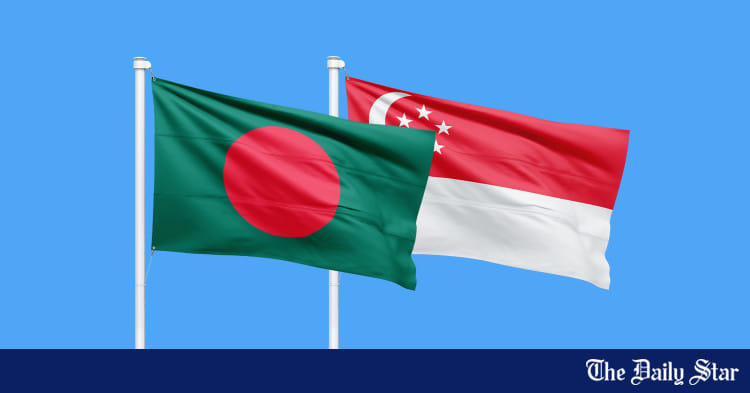Saif
Senior Member
- Messages
- 15,397
- Nation

- Axis Group


Bangladesh, Singapore seek transparent, cost-effective worker migration
Welfare of migrant workers a priority of govt, says Lutfey Siddiqi
Bangladesh, Singapore seek transparent, cost-effective worker migration
Welfare of migrant workers a priority of govt, says Lutfey Siddiqi

Bangladesh and Singapore today discussed ways in which the two countries could work together to further improve the end-to-end journey of prospective workers, help reduce costs, and enhance transparency.
Chief Adviser's Special Envoy Lutfey Siddiqi made a courtesy call on Singapore Minister of Manpower Dr Tan See Leng at the latter's office in Singapore and discussed the issues.
Siddiqi expressed gratitude for the professional approach to care that Singapore took towards migrant workers, as exemplified in the provision of healthcare.
Tan in turn expressed appreciation for migrant workers, including Bangladeshis in the construction sector, for their significant contributions to Singapore.
Siddiqi updated Tan, who is also Singapore's second minister for trade and industry, on the progress in the free trade agreement (FTA) negotiations between the two countries.
He expressed the hope that this would lead to a wider set of skills and sectors in which Bangladeshi talent can contribute.
Earlier, Siddiqi inaugurated a new online attestation service for IPAs at the Bangladesh High Commission in Singapore.
IPAs, or In-Principle Approvals, are preliminary work permits issued by the Singapore government.
As part of the recruitment process, Bangladesh requires that IPAs be seen and approved by a competent officer at the Bangladesh mission.
Prospective employers and their agents have long complained about the administrative burden of physically visiting the Bangladesh mission for this part of the process. With the introduction of the new online solution, this process can be completed entirely online.
Siddiqi, in a meeting with some representatives of Bangladeshi workers in Singapore, committed to addressing their grievances, said the chief adviser's press wing.
Subsequently, an inter-ministerial group, including the Secretary of the Ministry of Expatriates' Welfare and the Bangladesh High Commissioner in Singapore, ensured that the online solution, which was stalled for a few years, was delivered within a few weeks.
"Both the Chief Adviser Professor Yunus and Adviser Dr Asif Nazrul have identified the welfare of migrant workers as a key priority of this government," said the special envoy.
"We are working to improve the airport experience and passport service, monitor airfares, and generally act more responsively to their concerns. While there is a lot more work that needs to be done, it is encouraging to see some positive results," Lutfey Siddiqi said.
Welfare of migrant workers a priority of govt, says Lutfey Siddiqi
Bangladesh and Singapore today discussed ways in which the two countries could work together to further improve the end-to-end journey of prospective workers, help reduce costs, and enhance transparency.
Chief Adviser's Special Envoy Lutfey Siddiqi made a courtesy call on Singapore Minister of Manpower Dr Tan See Leng at the latter's office in Singapore and discussed the issues.
Siddiqi expressed gratitude for the professional approach to care that Singapore took towards migrant workers, as exemplified in the provision of healthcare.
Tan in turn expressed appreciation for migrant workers, including Bangladeshis in the construction sector, for their significant contributions to Singapore.
Siddiqi updated Tan, who is also Singapore's second minister for trade and industry, on the progress in the free trade agreement (FTA) negotiations between the two countries.
He expressed the hope that this would lead to a wider set of skills and sectors in which Bangladeshi talent can contribute.
Earlier, Siddiqi inaugurated a new online attestation service for IPAs at the Bangladesh High Commission in Singapore.
IPAs, or In-Principle Approvals, are preliminary work permits issued by the Singapore government.
As part of the recruitment process, Bangladesh requires that IPAs be seen and approved by a competent officer at the Bangladesh mission.
Prospective employers and their agents have long complained about the administrative burden of physically visiting the Bangladesh mission for this part of the process. With the introduction of the new online solution, this process can be completed entirely online.
Siddiqi, in a meeting with some representatives of Bangladeshi workers in Singapore, committed to addressing their grievances, said the chief adviser's press wing.
Subsequently, an inter-ministerial group, including the Secretary of the Ministry of Expatriates' Welfare and the Bangladesh High Commissioner in Singapore, ensured that the online solution, which was stalled for a few years, was delivered within a few weeks.
"Both the Chief Adviser Professor Yunus and Adviser Dr Asif Nazrul have identified the welfare of migrant workers as a key priority of this government," said the special envoy.
"We are working to improve the airport experience and passport service, monitor airfares, and generally act more responsively to their concerns. While there is a lot more work that needs to be done, it is encouraging to see some positive results," Lutfey Siddiqi said.


